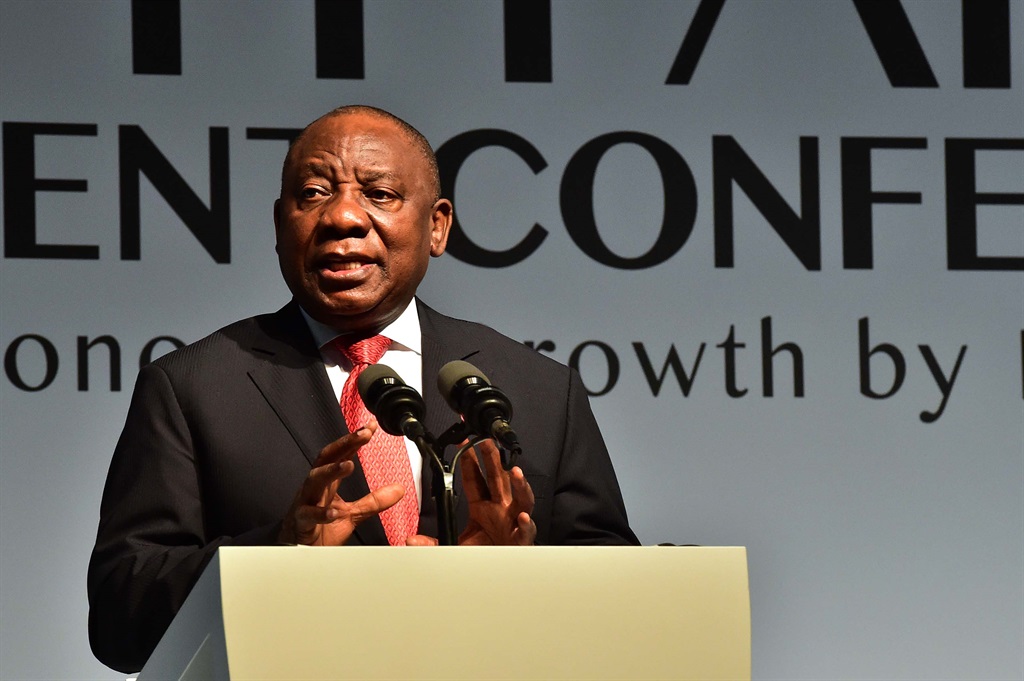
The country’s future is at stake. Big business can help bring it back from the brink, writes Hlengani Mathebula
The private sector makes up more than 70% of the South African economy.
It therefore follows that for the country’s economic growth rate to pick up speed, it has to come to the party.
That’s why the pledges by the private sector at the investment conference last month to invest R363 billion are welcome news.
The pledges come on top of the R300 billion announced at last year’s summit, moving South Africa closer to President Cyril Ramaphosa’s target of raising R1.2 trillion in his term of office.
If a substantial level of this target is met, it should make a meaningful contribution to the economy, at least in terms of raising the country’s investment rate, a key indicator of whether the country’s productivity capacity will expand or not.
To illustrate, let me use the highway analogy.
When roads are narrow two lanes, each going in one direction, and are full of sharp bends, vehicles travel at slower speeds, causing traffic bottlenecks.
But when roads are widened into multiple lane highways, traffic moves faster.
The economy operates in the same way.
Only high investment – more than 25% of GDP would be ideal for an economy with South Africa’s developmental needs – in the productive capacity of the economy can enable faster economic growth.
What will determine whether the increased investment makes a dent on unemployment and poverty, and possibly inequality, is the nature of the investment.
This is where the government’s role as the country’s economic policy manager comes in.
The second draft of the Economic transformation, inclusive growth, and competitiveness: A contribution towards a growth agenda for the South African economy, put together by National Treasury, could not have been clearer on this.
“In the South African context a growth-oriented policy agenda must be accompanied by interventions that change how the benefits of growth are distributed and fundamentally transform the systems and patterns of ownership and control that govern our economy (known as economic transformation).”
But economic transformation is a subject for another day. Let me stick to the role of the private sector, its role in bringing about faster growth.
There’s been a growing perception that the private sector has deliberately withheld investment, a view that draws sustenance from reports that point to more than R500 billion in cash collectively held by South African corporates.
As said earlier, the private sector has already made a good start in laying a foundation on which the economy can grow faster.
However, the private sector must avoid a repeat of what veteran businessman Johann Rupert spoke about last year.
Speaking at an event hosted by Power FM last year, Rupert said that the business sector had let former president Thabo Mbeki down by not investing more in the South African economy.
He said Mbeki had created a good environment for investment.
“We let [former] president Mbeki down because he created a perfect scenario for business to invest, but I think we couldn’t believe our luck and we should have invested more, as the private sector.”
The challenge for business today is that the sociopolitical environment under which Ramaphosa leads South Africa has changed for the worse relative to the period of Mbeki’s presidency.
Ramaphosa’s administration might not have the luxury of replicating, at least not in the short term, the perfect investment scenario Mbeki created.
The risk therefore is that the private sector holds back on investment, waiting for the Ramaphosa administration to create a perfect environment for investment.
That would be a grave error because that would worsen the country’s economic performance, a sure bet that the most hostile political forces to the private sector will wrestle political power away from those who want to create a stable South Africa but one that is prosperous for all.
After all, it’s not like the Ramaphosa administration is not working on improving the investment climate.
The Treasury document is extensive in terms of the measures to be implemented to improve the investment climate.
So too do the proposals on the reform of the power sector and the restructuring of Eskom.
There is, therefore, a basis for the private sector to cut the Ramaphosa administration some slack.
It is in the nature of politics that his administration’s agenda will not be implemented fully at once.
Some elements might move ahead faster than others. There might be setbacks, largely because of political obstacles.
But the failure by business to make a meaningful contribution will be catastrophic – economically and politically.
Read: SA is ready for a bountiful harvest as investor confidence grows
One cannot expect a free lunch from the private sector. Businesses will invest if there’s a chance of making a decent profit.
I would argue though that, as the financial results of many South African-based corporations demonstrate, there’s still money to be made.
There’s money to be made too on using South Africa as a base for expansion into the rest of Africa.
UK economist John Maynard Keynes was perhaps referring to a similar situation as South Africa’s when he coined the phrase ‘animal spirits’.
He wrote: “Enterprise only pretends to itself to be mainly actuated by the statements in its own prospectus, however candid and sincere. Only a little more than an expedition to the South Pole, is it based on an exact calculation of benefits to come. Thus if the animal spirits are dimmed and the spontaneous optimism falters, leaving us to depend on nothing but a mathematical expectation, enterprise will fade and die; though fears of loss may have a basis no more reasonable than hopes of profit had before.”
He said it was safe to say a business that depended “on hopes stretching into the future benefits the community as a whole”.
Keynes did caution in estimating the prospects of investment: “We must have regard, therefore, to the nerves and hysteria and even the digestions and reactions to the weather of those upon whose spontaneous activity it largely depends.”
But he said also that: “Human decisions affecting the future, whether personal or political or economic, cannot depend on strict mathematical expectation, since the basis for making such calculations does not exist; and that it is our innate urge to activity which makes the wheels go round, our rational selves choosing between the alternatives as best we are able, calculating where we can, but often falling back for our motive on whim or sentiment or chance.”
My point, therefore, is that strict mathematical calculations of investment returns, important as they are in investment decisions, aren’t, and shouldn’t be, the only criterion the private sector uses in the sociopolitical environment.
As Rupert pointed out, South Africans, businesspeople and government leaders have common goals and common ideals.
They should, to use Rupert’s words, “start talking to one another, instead of at one another. We either swim or sink together.”
It’s South Africa’s future that is at stake. And the private sector can help bring our country back from the brink.
Mathebula is the managing executive of Absa Private Bank, nonexecutive director of BMW SA Group and chairperson of the Black Business Executive Circle
 | ||||||||||||||||||||||||||
Get in touchCity Press | ||||||||||||||||||||||||||
| ||||||||||||||||||||||||||
| Rise above the clutter | Choose your news | City Press in your inbox | ||||||||||||||||||||||||||
| City Press is an agenda-setting South African news brand that publishes across platforms. Its flagship print edition is distributed on a Sunday. |




 Publications
Publications
 Partners
Partners








